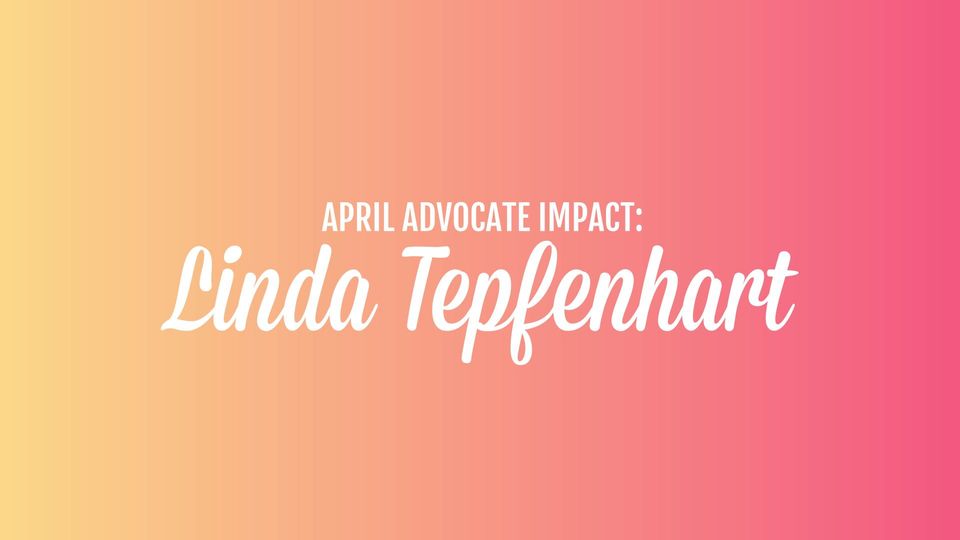Advocate Impact: Linda Tepfenhart
April CASA Advocate Spotlight
Written By: Linda's Advocate Supervisor

This is a story that started with three bother back in December 2013. The brothers ages 7, 4 and 2 were taken into CPS custody as a result of both domestic violence and substance abuse. Both parents were using and selling drugs. When the children were removed, there were also concerns about the living conditions of the home. Linda Tepfenhart has been the CASA advocate on this case since 2013. She has diligently advocated for the boys and was able to get the two youngest adopted in 2015. Unfortunately, Ronald the oldest child, had some special needs that prevented him from being adopted with his siblings. Ronald has been in foster care for the last 5 years. He is currently placed in a group home setting with the hope of one day being adopted. Linda has been a fierce advocate for Ronald for the last 5 years. She has been the only constant adult in his life through his journey in foster care. Linda has been by his side through at least 10 placements and 7 different CPS caseworkers. Linda has kept diligent records of his medical issues which has been vital with every change in placement and caseworker. Linda advocated for Ronald to receive specialized therapy to get to the root of his issues and to try to start the healing process from all the trauma he has experienced. Linda has also stressed the importance of Ronald maintaining sibling contact which has been tricky since his brothers have been adopted. Linda’s court reports are detailed and comprehensive and she has been persistently advocating for Ronald to find his forever home. She has been by Ronald’s side through multiple hospitalizations and placement changes that we were hoping would’ve been his adoptive home. Linda has requested medication reviews and specialist appointments to ensure that all his medical needs are being met.
Linda has been a fierce advocate for Ronald for the last 5 years. She has been the only constant adult in his life through his journey in foster care.
Recently Linda learned that she will have to move out of San Antonio and was very distraught about how this would impact Ronald. Throughout her advocacy Linda has always suggested that Ronald could benefit from a male mentor. It was decided that perhaps her move would be the perfect opportunity to have a male CASA take over so that Ronald would still have a voice in court, but he could also benefit from a male mentor. This case is a story of hope because it highlights the dedication that Linda has and the hope she brings for a positive future for Ronald. She has already gone above and beyond by advocating for Ronald for the last 5 years, and she has also ensured that Ronald will continue to have a voice in court once she moves. Child Protective Services has also approved Linda to continue to have contact with Ronald even after the new advocate steps in. They recognize the impact she has had and how she will continue to be a positive influence on his life. Linda has truly embodied the mission of CASA by being the one constant in Ronald’s life and he knows that she will always be a source of support for him.

In November 2025, Child Protective Services received a referral involving two sisters, ages 13 and 14, who were found caring for themselves. Following the death of their father, the girls experienced ongoing abuse and neglect. They were living in unsafe and unsanitary conditions, frequently left alone without adequate food, functioning plumbing, or consistent supervision, and were exposed to strangers regularly coming in and out of the home. Shortly after removal, Tameka Woolfolk was appointed as the Advocate on the case. From the very beginning, Tameka became one of the few consistent and reliable adults in the girls’ lives. The children experienced and continue to endure placement changes. These frequent transitions created ongoing instability and further complicated the girls’ ability to heal and adjust. Throughout each move, Tameka remained steadily involved, working diligently to ensure that the children’s services and support continued without interruption. She supports the girls not only emotionally, but physically as well helping pack their belongings at each move, accompanying them during school tours, and remaining readily available whenever they need support. Neither child was initially aware that they had the right to speak directly with the judge. Tameka recognized the importance of their voices being heard and with the support of the Ad Litem, helped to facilitate their presence at court, requesting that the judge meet with the girls in a breakout room, so they could personally express their wishes, all with the department, CASA and the Ad Litem by their side. In addition, this case was referred to Collaborative Family Engagement (CFE). During CASA’s ongoing exploration for family connections alongside the Department, Tameka discovered the children’s father’s obituary. Through this discovery, it was learned that the girls’ father had served in the United States Army as a combat medic during the Vietnam War and later worked for 30 years in civil service. Tameka took the initiative to request documentation, including VA records and a death certificate, to determine whether the children might be eligible for survivor benefits. The obituary also revealed that the girls are two of fourteen siblings. While many of the siblings were unable to provide support, CASA and the Department were able to establish contact with one brother. Through Tameka’s strong collaborative relationship with the Department and the Attorney Ad Litem, a thoughtful and appropriate plan was developed to allow the girls to begin visits with their brother, his wife, and their cousins. Although this story is still unfolding, both girls know one unwavering belief, that no matter what comes next, they know that Miss Tameka will continue to stand beside them every step of the way.







